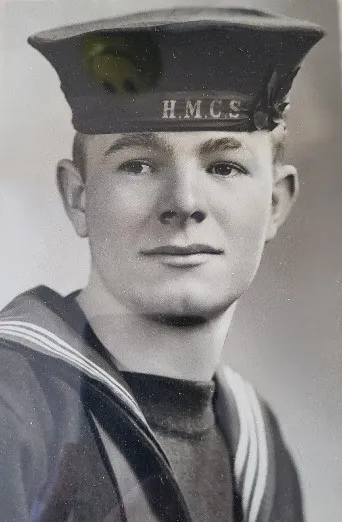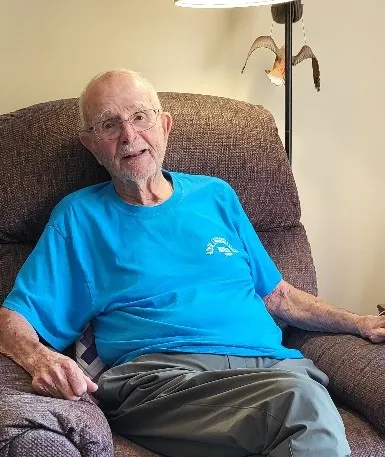245 Grand River Street North
Navy Gunner Henry Foster
Henry Percival Foster is the oldest World War Two veteran living in Paris.

Henry was born in Montreal in 1925. His father, also Henry Foster, and mother, Harriet Brown, came from England, though not at the same time. She arrived in Canada when she was 25 years of age. Henry had a brother, John Gilbert, but he died at 9 years of age when the family lived at Granby Quebec.
Henry was back in Montreal in 1942 when he enlisted with the Royal Canadian Navy. He admits that he did not enjoy his time at high school in Montreal. He said that all the teachers were old men, the younger ones having enlisted already. He tried to enlist in the Navy himself when he was 17 years old but needed a parent’s permission since he was so young. He got their permission and returned to the recruiting office the following day. He was handed his kit on the spot and told he would be on the train the next day for training in Quebec City.
After Quebec City, Henry was shipped to British Columbia, then to Levis, Quebec. He was trained as a gunner aboard a Defensively Equipped Merchant Ship (DEMS). The function of these ships was to act as a deterrent against German U-Boats. They joined convoys that were shuttling men and equipment from Canada across the Atlantic Ocean to Europe. Their summer port was Montreal, and their winter port was St. John, New Brunswick. The ships he served on were called fast ships, weighing 10,000 tons carrying a crew of 8 gunners who would take rotating shifts through the day and night.
Henry said that the worst thing confronting these ships were the storms and the fog, when it was difficult to keep the convoy ships in formation without ramming one another. There were often dozens of ships sailing in convoy, often covering several square miles. And there were other deadly dangers as well. Henry mentioned a time when the sailors were relaxing on deck when they saw a single airplane fly over. They recognized it as a German spotter plane. Shortly after, a German U-Boat torpedoed the ship next in line to Henry’s. U-Boats were a constant threat to the convoys. He recalls that frequently, they would hear an explosion and see smoke and flames where one of the ships had been. It was incredibly difficult to see the bodies of soldiers and sailors drifting by their ship and being unable to pick them up. In the cold North Atlantic water, those men would have been dead in minutes.
But Henry also remembers other more personal, happier moments while he was in service. After the war began to turn in favor of the Allies in 1944, Henry’s ship sailed the Mediterranean Sea to Italy, to bring supplies to the troops fighting in the Italian campaign. He remembers a day when a small group of Italians fighting a guerrilla war against the Germans came aboard. The food aboard ship was not always satisfying, and Henry would bring a brick of Velvetta cheese for variety. He remembers trading the cheese for some Chianti wine and even a mandolin which the partisan insisted he take. The partisans took the munitions they came for and returned to shore, and Henry never heard what became of them. He tells another a story about two Norwegian soldiers who helped him out of a tight spot in a bar, because he had treated them to a round on their last trip in port. He tells another story about finding a fellow soldier going through his kit bag. He lost the fight but earned the respect of the rest of his crew.
Henry has just too many stories to relate them all here. Despite the dangers, Henry admits that it was a great experience for a young guy. He saw a lot of the world and for a young man in his teens, he witnessed a lot about human nature, both good and bad. He admits to feeling somewhat guilty that he did not face the dangers of many of those who served, but the truth is, that could have been his ship that was torpedoed. He remained in the military until the end of the war.

Following the war, Henry had a varied business career, mainly in the textile industry, and as far away as New Zealand. He married his wife, Sybil Savage, in 1947. They raised three daughters, Sherry, Debbie and Sheila. Henry has lived in Paris since 1963, and he has long been an active member of Paris Legion Branch 29. On June 30, 2024, the street running beside the Paris Library was renamed Henry Foster Lane, commemorating his remarkable service to this community and to his country.
